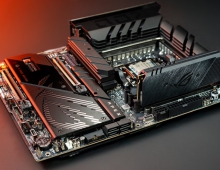
AMD Chipsets Integrating USB 3.0 Coming Soon
AMD will support USB 3.0 in its chips, marking the first instance of a major PC processor supplier getting behind the standard.
The USB Implementers Forum today announced that AMD will deliver the first chipsets to integrate support for USB 3.0, aka SuperSpeed USB.
The A75 and A70M FCH chipsets from AMD represent a major milestone for broad SuperSpeed USB adoption among manufacturers, as built-in USB 3.0 support enables designers to incorporate SuperSpeed USB into their systems.
Certification of AMD A75 and A70M FCH chipsets provides assurance to manufacturers and consumers that the SuperSpeed USB chipsets are interoperable and comply with the USB 3.0 specification. Both chipsets are shipping today, according to AMD.
The theoretical raw bandwidth gap between USB 3.0 and USB 2.0 is expetced to be around 10 times while transfer speed will be faster by 5 times.
"The integration of SuperSpeed USB into AMD's Fusion Controller Hubs demonstrates AMD's commitment to providing the industry's latest, most innovative connectivity technologies," said Chris Cloran, AMD Corporate Vice-President and General Manager, Client Group, "AMD Fusion Controller Hubs will provide competitive performance while consuming low power with active USB 3.0 traffic for high definition video and fast connectivity with the latest SuperSpeed USB devices."
Analyst firm In-Stat forecasts that SuperSpeed USB will see a shift in the marketplace as a result of the newly certified chipsets. "Chipset integration is essential in order to make the latest version of USB dominant in the marketplace, and the first SuperSpeed USB chipsets will greatly impact adoption," said Brian O'Rourke, Principal Analyst, In-Stat.
However, there not any peripheral controllers for USB 3.0 in general release yet. The majority of peripheral devices with USB 3.0 today are external hard drives and a few flash drives. The peripheral controllers are expected to be produced in large volume as soon as more devices appear at the market. And this is expected to happen when USB 3.0 will be integrated into chipsets.
Earlier this week the USB Implementers Forum just announced the certification of the TUSB7340 SuperSpeed USB (USB 3.0) four-port host controller and the TUSB7320 SuperSpeed USB two-port host controller from Texas Instruments.
AMD's rival Intel is also expected to integrate USB 3.0 into its chipsets, but possibly not earlier than next year. Intel is currently putting its weight behind Thunderbolt tech, which is now shipping with Apple's 2011 MacBook Pro line.
Certification of AMD A75 and A70M FCH chipsets provides assurance to manufacturers and consumers that the SuperSpeed USB chipsets are interoperable and comply with the USB 3.0 specification. Both chipsets are shipping today, according to AMD.
The theoretical raw bandwidth gap between USB 3.0 and USB 2.0 is expetced to be around 10 times while transfer speed will be faster by 5 times.
"The integration of SuperSpeed USB into AMD's Fusion Controller Hubs demonstrates AMD's commitment to providing the industry's latest, most innovative connectivity technologies," said Chris Cloran, AMD Corporate Vice-President and General Manager, Client Group, "AMD Fusion Controller Hubs will provide competitive performance while consuming low power with active USB 3.0 traffic for high definition video and fast connectivity with the latest SuperSpeed USB devices."
Analyst firm In-Stat forecasts that SuperSpeed USB will see a shift in the marketplace as a result of the newly certified chipsets. "Chipset integration is essential in order to make the latest version of USB dominant in the marketplace, and the first SuperSpeed USB chipsets will greatly impact adoption," said Brian O'Rourke, Principal Analyst, In-Stat.
However, there not any peripheral controllers for USB 3.0 in general release yet. The majority of peripheral devices with USB 3.0 today are external hard drives and a few flash drives. The peripheral controllers are expected to be produced in large volume as soon as more devices appear at the market. And this is expected to happen when USB 3.0 will be integrated into chipsets.
Earlier this week the USB Implementers Forum just announced the certification of the TUSB7340 SuperSpeed USB (USB 3.0) four-port host controller and the TUSB7320 SuperSpeed USB two-port host controller from Texas Instruments.
AMD's rival Intel is also expected to integrate USB 3.0 into its chipsets, but possibly not earlier than next year. Intel is currently putting its weight behind Thunderbolt tech, which is now shipping with Apple's 2011 MacBook Pro line.





















